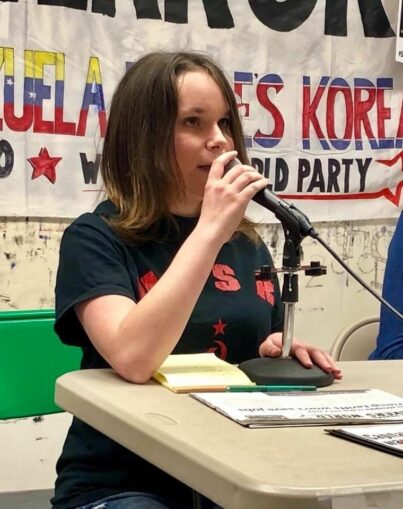

Kristin Turgeon


Kristin Turgeon
By Kristin Turgeon
This is a lightly edited version of a talk given on the Oct. 22 Workers World Party webinar, “Voter suppression and COVID and their impact on disabled people.”
Voting has always been a hot topic, and in the 2020 election many people see it as vital. Every time you go online or turn on the TV or radio you hear and see PSAs exhorting you to vote.
What has also thankfully come to light is voter suppression targeting poor communities, especially communities of color. This is not new, of course, but some people are hearing of it for the first time and there has been a lot of grassroots action taken to try to fix the problem.
However, one form of voter suppression is hardly being talked about. It is extremely hard for disabled people to vote. When I, a blind person, tried to vote in 2016 I was unable to. I tried to request an absentee ballot and was told I had to fill out an application, but when I went to fill it out online the website was not accessible with a screenreader – without which I couldn’t use a computer.
When I called the town office to report this and ask for help I never received a call back. I’m not the only visually impaired person who was unable to vote. Absentee ballots aren’t accessible in 43 states. With every state using a different system, visually impaired people all over the country are struggling with accessibility challenges.
With Covid spiking in many areas, people don’t feel safe going to the polls or having someone help them fill out paperwork that we should be able to fill out ourselves. We shouldn’t have to choose between not voting at all or not having a private vote. Many polling places are also not accessible to wheelchair users or to seniors. People with developmental disabilities can and have been barred from voting.
Voter suppression shows struggles are intertwined
This is not to say that this form of voter suppression stands alone; in fact, the opposite is true. Although all of these accessibility problems violate the ADA [Americans with Disabilities Act], administrations in some states are using the inaccessibility of polling places in communities of color to shut them down. This is both racist and ableist. Why didn’t they move the polling places to a more accessible location?
This proves that the struggle against ableism is intertwined with the struggles against racism, sexism, homophobia, xenophobia, and all our other struggles – none of which will be ended by voting. History shows us that real human rights are only won through the rising of the workers and the oppressed.
That doesn’t mean that you shouldn’t vote if you feel like it’s important. It also doesn’t mean that the right to vote doesn’t matter. But I’m a socialist and an anti-capitalist. I don’t feel that any real and lasting change can come from Joe Biden and certainly not from Trump.
Police brutality will not end under Biden. Evictions and high rents won’t end under Biden. The fascists aren’t going to evaporate or leave the country if Trump loses.
Change will only come when we the people fight for the world we want. A world in which everyone has food, a home, healthcare, a job, and an education. A world where those things are considered human rights instead of a world driven only by profit. Then we will have free and fair elections and the lesser of two evils will no longer be the best bad choice.
The epic struggle of the Palestinian people against the full weight of U.S. imperialism and…
The following report comes from the Bronx Anti-War Coalition organizers on a protest held in…
In the Canadian federal elections held on April 28, the Liberals won with 169 seats…
The following is Part 2 of a talk given by the author to a meeting…
Boston Students, professors and workers are confronting the Trump administration’s fascist crackdown at universities across…
Philadelphia Within days of Swarthmore students reviving a pro-Palestinian encampment on April 30, police arrested…